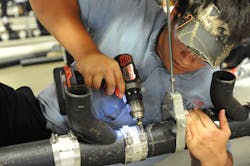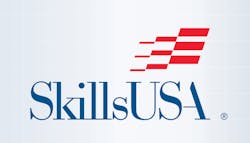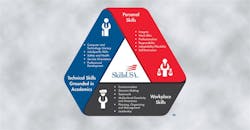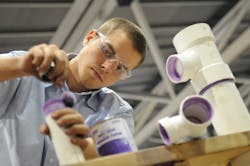SkillsUSA: Helping to Close the Skilled Labor Gap
Hiring managers across the country find it difficult to hire people for skilled trades careers in 2021; a Monster.com survey reports that the skills gap and its impact on finding qualified candidates continue to be a top challenge.
“Remarkably, a third of U.S. employers say the skills gap has increased compared to last year, and 80 percent of employers say they have difficulty filling openings due to skills gaps as opposed to a year ago,” the report says (https://bit.ly/3rNc8a9).
A March Businesswire report notes that job postings for plumber apprentices had increased by 24 percent since the previous month, and those were unfilled for an average of 29 days (https://bwnews.pr/3C3UZOl).
“The skilled trades are in dire need of workers right now, with a particularly high demand for apprentice-level and skilled labor positions,” notes Jill Quinn, executive leader of PeopleReady Skilled Trades, in the Businesswire article. “These are steady, well-paying jobs that hold a bright future, even in an unpredictable economic climate.
In 2021, construction companies will need to hire 430,000 more workers than they employed in 2020 to meet demand, according to a March analysis of the U.S. Bureau of Labor Statistics released by Associated Builders and Contractors. From 2020 to 2023, the need for construction workers is projected to rise by at least 1.28 million (https://bit.ly/3A0KYPP).
Like most complex problems, engaging young people in the trades will need a complex solution. A cookie-cutter approach will not work as employers and employees have different needs depending on what part of the country they’re in or what size region they service.
Education is always the best start. This is where career and technical schools (formerly known as vocational schools) can help. They can demonstrate to young people that if they like to build things, if they like to see how machines and equipment work, if they like to repair what’s broken, if they want to be a service to their communities, a skilled trades career can open up a multitude of opportunities for them.
And career and technical education (CTE) seems to be on the rise, as well as STEM (science, technology, engineering and math) and STEAM (science, technology, engineering, arts and math) programs in schools around the country. This gap is not only prevalent in the construction industry but also manufacturing, transportation, utilities and other technical industries that allow this country to flourish.
CTE can help those students who do not envision themselves working in corporate America or cannot afford to go into debt to finance a four-year college degree. iCEV, an online CTE resource, notes that 81 percent of high school drop-outs say that “relevant real-world learning opportunities would have kept them in high school.”
It also states that the “average high school graduation rate for students concentrating in CTE programs is 93 percent, compared to an average national freshman graduation rate of 80 percent.”
The SkillsUSA factor
One of the most prominent names in career and technical education is SkillsUSA. As a CTE student organization, its primary focus is partnering with CTE educators and industry businesses to ensure a skilled workforce for the future. It also helps establish industry standards for job skill training through its annual technical contests.
Its mission statement says it all:
“SkillsUSA empowers its members to become world-class workers, leaders and responsible American citizens. We improve the quality of our nation’s future skilled workforce through the development of SkillsUSA Framework skills that include personal, workplace and technical skills grounded in academics. Our vision is to produce the most highly skilled workforce in the world, providing every member the opportunity for career success.”
More than 650 business, industry and labor organizations actively support SkillsUSA at the national level through financial aid, in-kind contributions and involvement of their people in SkillsUSA activities. Many more groups work directly with state associations and local chapters.
The organization is recognized by the U.S. Department of Education and is cited as a “successful model of employer-driven youth development training program” by the U.S. Department of Labor.
SkillsUSA doesn’t garner these accolades by focusing only on technical education; it has a three-pronged, balanced approach to career development. The SkillsUSA Framework emphasizes personal, workplace and technical skills grounded in academics—a “blueprint for career readiness.”
Personal development includes integrity, work ethic, professionalism, responsibility, adaptability and self-motivation. Workplace skills include communication, decision-making, teamwork, multicultural sensitivity and awareness, planning/organizing/management and leadership.
Employers expect employees to be capable of performing the job-specific skills for which they were hired. SkillsUSA goes further in ensuring that CTE students are computer literate and tech-savvy, and they understand the health and safety issues of their chosen industries. Service orientation and professional development highlight avenues to advance on their career paths.
SkillsUSA notes that this approach works because it “empowers every student to achieve career success, delivers a skill set demanded by business and industry but lacking in many employees today, and ensures that every student member receives a consistent and specific skill set.”
The ‘CTE Olympics’
The state contest winners compete on the national level in 102 trade, technical and leadership competitions, plus five demonstration events. Contests are run with the help of industry, trade associations and labor organizations; the respective industries set test competencies.
The COVID-19 pandemic led to the cancellation of last year’s national competition; in 2021, it was a hybrid event with virtual and in-person participation.
In the plumbing contests, 21 high school and college/postsecondary (C/PS) students competed for national CTE championship glory.
1. High school winners (plumbing):
• Champion: Dylan Fil, Smith Vocational & Agricultural High School (Massachusetts)
• Silver: Preston Hyatt, Eureka Springs High School (Arkansas)
• Bronze: Andrew Hahn Jr., Frederick County Career & Tech Center (Maryland)
2. C/PS winners (plumbing):
• Champion: Gabriel Sacco, Virginia Technical Institute
• Silver: Emmanuel Cornejo, Georgia Northwestern Tech College
• Bronze: Ito Simon, Santa Fe College (Florida)
Twenty-seven high school and C/PS students competed for CTE gold in the HVACR contests.
1. High school winners (HVACR):
• Champion: Gabriel Chaves-Silva, Blackstone Valley Regional Vocational Technical High School (Massachusetts)
• Silver: Kian Howard, Hennepin Tech College-Brooklyn Park (Minnesota)
• Bronze: David Jansen, WSU Tech (Kansas)
2. C/PS winners (HVACR):
• Champion: Chad Wollenberg, Manhattan Area Technical College (Kansas)
• Silver: Andrew Franz, Hennepin Tech College-Brooklyn Park (Minnesota)
• Bronze: Wesley Francis, Guilford Tech Community College (North Carolina)
In the Monster.com study previously mentioned, the top skills employers want are dependability, teamwork/collaboration, problem-solving and flexibility—skills that CTE students learn through the SkillsUSA Framework. Combining personal, workforce and technical skills in a career development plan reaps many benefits for SkillsUSA students.
Are you involved in SkillsUSA or other CTE facilities in your community or state? You might find a future tech or management leader for your company if you make the time.
Kelly Faloon is a contributing writer to Contractor magazine and principal of Faloon Editorial Services. The former editor of Plumbing & Mechanical magazine has more than 20 years of experience in the plumbing and heating industry and B2B publishing. She is a journalism graduate of Michigan State University.
About the Author

Kelly L. Faloon
Freelance Writer/Editor
Kelly L. Faloon is a contributing editor and writer to CONTRACTOR, Contracting Business magazine and HPAC Engineering and principal of Faloon Editorial Services. The former editor of Plumbing & Mechanical magazine, Faloon has more than 26 years of experience in the plumbing and heating industry and more than 35 years in B2B publishing. She started a freelance writing and editing business in 2017, where she has a varied clientele.
Faloon spent 3 1/2 years at Supply House Times before joining the Plumbing & Mechanical staff in 2001. Previously, she spent nearly 10 years at CCH/Wolters Kluwer, a publishing firm specializing in business and tax law, where she wore many hats — proofreader, writer/editor for a daily tax publication, and Internal Revenue Code editor.
A native of Michigan’s northern Lower Peninsula, Faloon is a journalism graduate of Michigan State University. You can reach her at [email protected].



